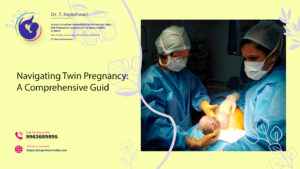99 Fever During Pregnancy
The average body temperature is around 370C (98.60F). Body temperature does fluctuate throughout the day. However, a slight variation in body temperature doesn’t always mean that a woman has a fever. Doctors consider 99.3oF (37.4oC) and above a fever.
This is quite natural for a pregnant woman to worry if she has a fever – owing to this question in her mind – would the fever be harmful to her baby or will her baby be okay? Many pregnant women worry that fever could be potentially harmful to their growing baby. However, fever is typically not dangerous if it is not due to any underlying serious cause.
In general, fever during pregnancy is often a symptom of an underlying condition. It must be addressed as early as possible to prevent the risk to the growing baby. Fever in a pregnant woman may affect her growing baby if it is due to an underlying cause.
Does fever harm my baby during pregnancy?
Fever, in general, does not harm your baby during pregnancy. But when fever is a sign of infection that a pregnant woman is fighting, the risk of complications may increase. That’s why it’s essential to seek treatment right away.
Can fever cause pregnancy loss?
Miscarriage or pregnancy loss occurs in approximately around 20% of pregnancies. If an infection causes a rise in body temperature, then the risk of pregnancy loss increases. Fever in general does not cause pregnancy loss though. Studies strongly suggest a link between an infection and pregnancy loss. Owing to this reason, up to 15% of early pregnancies and around 66% of late pregnancy losses can be attributed to infections during pregnancy.
An inconclusive research study shows a link between fever during early pregnancy and an increased risk of jaw and heart defects at birth.
Diagnosis and Treatment
Knowing the underlying cause of fever is important for a gynecologist to treat fever. Therefore, an accurate diagnosis of the underlying cause is critical. A gynecologist will prescribe medications depending on what is causing the fever. The use of medicines should be done judiciously during pregnancy.
Over-the-counter medications: It is always better to discuss with your gynecologist the use of antipyretic, and pain-relieving medicines during pregnancy. Some OTCs medicines are not considered safe during pregnancy.
If the cause of the fever is due to bacterial infection, gynecologists consider prescribing safe antibiotics for the treatment. Gynecologists consider the safety and efficacy of antibiotic use during pregnancy. Although a majority of antibiotics are considered to be safe, only 10 to 15% of antibiotics medications have sufficient data pertaining to their safety and effectiveness during pregnancy. A gynecologist performs a risk assessment and monitors the use of antibiotics during pregnancy.
If fever is due to cold or flu infections that are mostly due to viruses, then your gynecologist considers prescribing safe, effective, and risk-free antiviral medications if necessary.
Bottom Line
What should a pregnant woman do if she gets a fever during pregnancy? First of all, she should not panic, just relax and call her doctor – it is better not to take any medicines prior to discussing with your doctor.
Women in their first trimester of pregnancy should seek treatment immediately if they have a high fever above 102 degrees. This will help prevent potential risks and complications in the long run.
Fever during pregnancy – you should deal with it cautiously as it may cause complications. If you develop a fever along with these symptoms: severe cramps, lightheadedness, dark urine, low urine output, severe thirst, decreased movement of the fetus, and breathing difficulty, seek medical help immediately.




